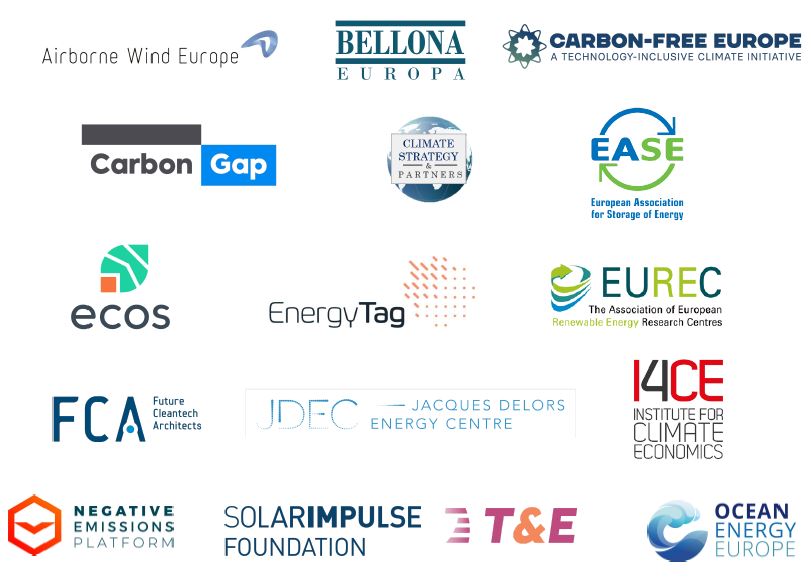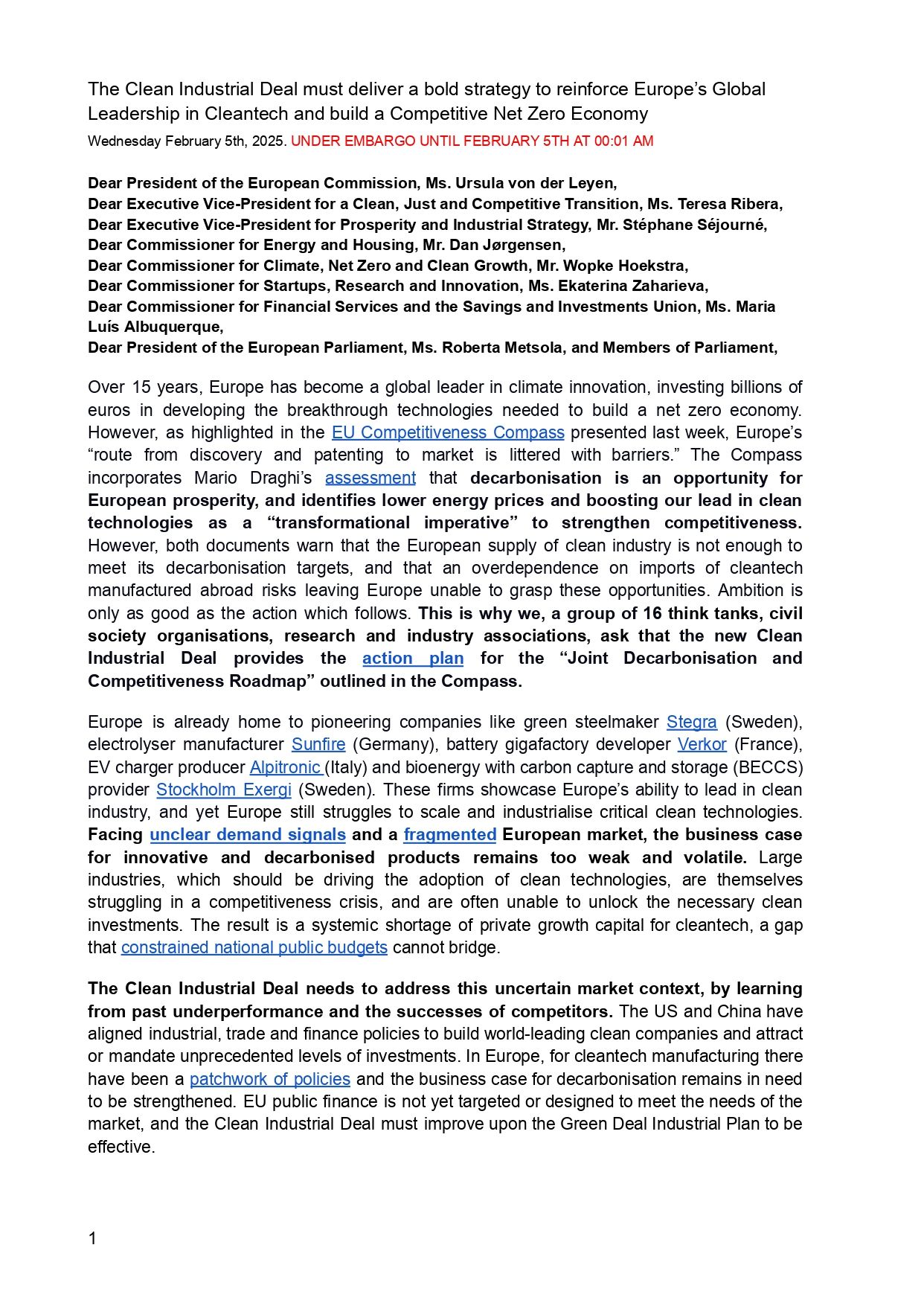Open letter: The Clean Industrial Deal must deliver a bold strategy to reinforce Europe’s Global Leadership in Cleantech and build a Competitive Net Zero Economy
The EU Competitiveness Compass has made connecting decarbonisation and competitiveness a “strategic imperative” for Europe. This will be delivered by the all-important Clean Industrial Deal – the flagship policy package on which this new Commission hopes to upgrade Europe’s industrial base and tackle the climate crisis simultaneously.
16 European think tanks, civil society organisations, and industry associations, including I4CE, have sent an open letter to the Commission delivering a bold strategy to build strategic cleantech industries in Europe. The Clean Industrial Deal must incentivise industrial companies to integrate cleantech into their processes and shift to a decarbonised, circular and innovative business model. This strategy should be backed up by commensurate investments and de-risking instruments, to transform the vision of the Competitiveness Compass into concrete action.
This letter calls for the EU to turn the Clean Industrial Deal into an effective Joint Decarbonisation and Competitiveness Roadmap that closes Europe’s innovation- to-market gap. Facing unclear demand signals and a fragmented European market, the business case for innovative and decarbonised products remains too weak and volatile. The letter offers clear guidance on how to strengthen this business case – with a focus on three pillars:
- Access to clean, abundant, affordable and resilient domestic energy and its delivery infrastructure, which are essential for the growth of a sustainable industrial base.
- A European Cleantech and Industrial Strategy that delivers sectoral decarbonisation and competitiveness, fostering a vibrant European market for clean technologies, their production and their value chains.
- Unlocking private investment through a Cleantech Investment Plan with clear financial incentives and de-risking mechanisms to create robust, sizable markets that can drive the wide adoption of clean technologies in Europe and beyond.
Our 15 specific proposals , inter alia, provide a structure that will deliver fiscal headroom for Member States to boost clean investments, improve the EU budget, crowd-in private investments, create robust lead markets for the uptake of clean products, and strengthen Europe’s leadership in next generation technologies.
Quotes from signatories:
- “The Clean Industrial Deal must be anchored to a European Competitiveness Fund focused on strengthening and improving existing EU funds that work well for cleantech investments. This is achieved by integrating EU-level “as-a-service” finance instruments, modelled after the InvestEU Member State compartments, to enable more targeted public investment in climate assets and businesses, while safeguarding the integrity of the Single Market.”
Adriana Rodríguez, EU Policy lead at Climate Strategy
- “The Competitiveness Compass points the way for the crucial Clean Industrial Deal – but the tricky part will come when designing policy that can support cleantech innovators, and governance that brings national governments and the Commission together for a green industrial strategy. If the Commission can succeed in this, we have a chance to face our economic challenges head on.”
Ciaran Humphreys, Research Fellow, Institute for Climate Economics (I4CE)
- “The Clean Industrial Deal must accelerate the full innovation cycle – from research to scale-up, ensuring abundant, affordable, and reliable clean energy. Decarbonizing hard-to-abate industries like cement and aviation requires industrial electrification, innovative renewables, and clean firm power, backed by energy flexibility tools for stability and lower costs. By aligning regulation, de-risked financing, and lead markets, Europe can drive large-scale adoption and secure its industrial leadership in net-zero manufacturing.”
Marlène Siméon, Head of EU Policy, Future Cleantech Architects
- “The Clean Industrial Deal must leverage the potential of ETS revenues spent towards industrial decarbonisation by only considering those initiatives that deliver substantial climate impact, create systemic change, are timely and scalable, and adhere to the ‘Do No Significant Harm’ principle”
Francesco Lombardi Stocchetti, Policy Advisor, Bellona
- “The Clean Industrial Deal must tackle the major EU’s investment challenge by driving decarbonisation and innovation. The future European Competitiveness Fund should be the financial backbone of a green industrial strategy, scaling up domestic clean tech manufacturing in key sectors like batteries and clean fuels for aviation and shipping. Beyond the next EU budget, the CID must secure substantial new funding to close the investment gap through 2030.”
Till Eichler, Policy Office Sustainable Finance, T&E
- “Guarantees are essential to lower the cost of capital and attract the required private investment to bridge the funding gap for the first ocean energy pre-commercial farms. Europe is the global leader in ocean energy, but the U.S and China are rapidly catching up thanks to massive government funding and policy support. Guarantees are the missing piece of the puzzle to take the industry to the next level and secure the industrialisation in Europe.”
Valentin Dupont, Senior Policy Officer, Ocean Energy Europe
- “We welcome the Competitiveness Compass’s commitment to creating incentives for permanent carbon dioxide removal. Gradually integrating CDR into EU climate policy is essential for scaling up the sector and achieving climate neutrality. More immediate policy and financial support is needed, however, to drive demand for removals over the next five years. We propose a robust mix of instruments — including CDR targets, a public procurement programme, a Carbon Clearing House, alongside continued support towards RD&I and high-quality standards – as essential for making Europe a competitive leader in CDR. The forthcoming Clean Industrial Deal is a key opportunity for the EU to commit to such bold and necessary action.”
Christoph Beuttler, Carbon Gap CEO
You can find the joint letter here
Signatories


